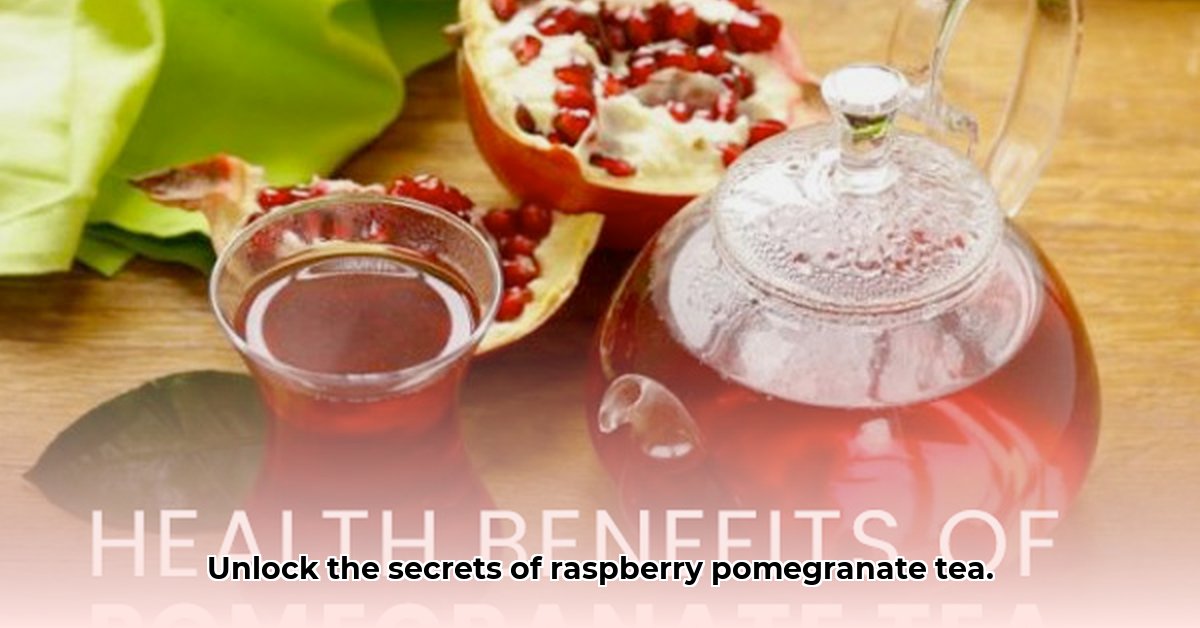
Raspberry pomegranate tea, a delightful blend of tart and sweet, offers a refreshing beverage with potential health benefits. This guide explores its advantages, potential side effects, and brewing instructions, empowering you to make informed choices about incorporating it into your wellness routine.
Potential Benefits of Raspberry Pomegranate Tea
This vibrant tea combines the nutritional power of raspberries and pomegranates, potentially offering a range of health benefits. However, it's crucial to remember that much of the research focuses on the individual fruits, and further studies are needed to definitively confirm the combined effects in tea form.
Antioxidant Powerhouse
Both raspberries and pomegranates are rich in antioxidants, particularly anthocyanins (pigments responsible for their vibrant colors). These compounds combat free radicals, potentially reducing cell damage associated with aging and various health problems. While individual fruit studies support these claims, more research is needed to confirm the synergistic effect of their combination in tea.
Immune System Support
Raspberry pomegranate tea's abundance of vitamins and minerals, including vitamin C, suggests potential immune-boosting properties. While direct research on the tea's impact is limited, the nutritional profile indicates a potential contribution to a robust immune response. Remember, this is a supporting role, not a replacement for a healthy, balanced lifestyle.
Digestive Health
Pomegranate's potential anti-inflammatory properties may ease digestive discomfort, while raspberries' fiber content promotes regular bowel movements and gut health. Again, research primarily focuses on the individual fruits, requiring further investigation to confirm the tea's effects on digestion.
Cardiovascular Health Potential
Early research indicates that the antioxidants in pomegranate may protect blood vessels, potentially benefiting cardiovascular health. However, more robust studies are needed to support these preliminary findings definitively. This tea should not replace recommended cardiovascular health practices.
Potential Side Effects and Precautions
While generally safe, raspberry pomegranate tea may cause mild digestive upset in individuals sensitive to tannins (compounds found in many teas). Allergic reactions are rare. Pregnant or breastfeeding individuals, or those with underlying health conditions, should consult their doctor before consumption. Always pay attention to your body’s response and discontinue use if you experience any unusual symptoms.
How to Prepare Raspberry Pomegranate Tea
This section provides clear instructions for brewing raspberry pomegranate tea using both fresh and dried ingredients.
Method 1: Fresh Ingredients
- Rinse fresh raspberries and pomegranate arils thoroughly.
- Add 1-2 tablespoons of each to 8 ounces of slightly cooled boiled water.
- Steep for 5-10 minutes, adjusting according to preference.
- Strain through a fine-mesh sieve to remove fruit.
- Add honey or another natural sweetener, if desired.
Method 2: Dried Ingredients
- Use 1-2 teaspoons of dried raspberry leaves/berries and pomegranate peel per 8 ounces of slightly cooled boiled water.
- Steep for 5-10 minutes, adjusting steeping time for desired strength.
- Strain as above.
- Add natural sweetener as desired.
Dosage and Usage Recommendations
Begin with one cup daily. Observe your body's response. While generally well-tolerated, excessive consumption might cause digestive issues. This tea complements a balanced diet and regular exercise; it's not a replacement for a healthy lifestyle.
Conclusion: A Delicious and Potentially Beneficial Brew
Raspberry pomegranate tea offers a potentially beneficial and flavorful addition to a healthy lifestyle. While research suggests several potential health benefits, more studies are needed to establish definitive claims. Consult your healthcare provider before using this tea to treat any health condition. Enjoy responsibly!